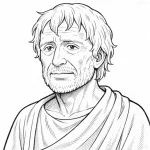“We should every night call ourselves to an account: what infirmity have I mastered today? what passions opposed? what temptation resisted? what virtue acquired? Our vices will abate of themselves if they be brought every day to the shrift.”

- c. 4 BC – AD 65
- Roman
- Philosopher, Statesman, Dramatist, Stoic Thinker, Advisor to Emperor Nero
table of contents
Quote
“We should every night call ourselves to an account: what infirmity have I mastered today? what passions opposed? what temptation resisted? what virtue acquired? Our vices will abate of themselves if they be brought every day to the shrift.”
Explanation
Daily self-examination is the path to moral progress. Seneca the Younger advocates for a nightly practice of reflection, in which we hold ourselves accountable for our actions, desires, and efforts toward virtue. By consistently questioning how we lived each day—what we resisted, overcame, or embraced—we train the soul in discipline and clarity.
This Stoic exercise mirrors the idea that philosophy is not abstract theory but a practical tool for inner development. For Seneca, vices thrive in darkness and evasion; once they are acknowledged and brought into the light of honest scrutiny, they begin to lose their power. The act of confession—not to others, but to oneself—is a powerful moral correction that leads to greater self-command and serenity.
In modern life, where distractions are constant and self-awareness often shallow, this wisdom remains deeply relevant. A brief moment of quiet reflection—asking what we did well, where we fell short, and how we might do better—can guide our growth far more than grand resolutions. Seneca’s method is simple but profound: examine yourself daily, and you will steadily become your best self.
Would you like to share your impressions or related stories about this quote in the comments section?




